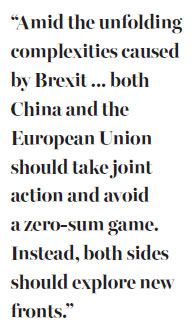FTA focused on services should be priority
Updated: 2016-08-12 07:55
By Chi Fulin(China Daily Europe)
|
|||||||||
The foundations have already been laid to merge trade negotiations with those for a bilateral investment treaty
At present, the world is at a crossroads of resisting rising trade protectionism and promoting trade liberalization. If a good choice is made, a new round of globalization, with trade in services playing the key role, will drive sustainable growth of the world economy. Otherwise, there will be a new round of worldwide trade wars with no winners, which will add more uncertainty to the global economic and political situation.
Amid the unfolding complexities caused by Brexit - which not only affects the European economic integration process and increases uncertainty in economic globalization, but also gives rise to trade protectionism - both China and the European Union should take joint action and avoid a zero-sum game. Instead, both sides should explore new fronts.
Trade in services has a key role to play in deepening China-EU economic cooperation. With the rapid development of global services trade, the hot spot and priority for global investment and trade have shifted to the services sector, and the focus of global free trade agreement negotiations has also switched to the services trade. After such a trend, service trade has become the focus of deepening China-EU economic cooperation. Yet at the same time, the services trade has become the area worst hit by protectionism.

Under such circumstances, to counteract trade protectionism, China and the EU should focus their efforts on opposing protectionism to break down services trade barriers, especially technical ones. Against this backdrop, China and the EU should lose no time in establishing an FTA, with the services trade as a priority, by 2020.
The time between now and 2020 is a critical period for rebalancing the global economy and the economic transformation in China and the EU. With the rapid unleashing of potential demand from Chinese for services, economic complementarity between China and the EU will be further strengthened.
The European Commission recently released its Elements for a New EU Strategy on China. This document, although attaching more importance to negotiations toward a China-EU FTA, is still far away from the requirements to deepen economic cooperation.
Once Britain leaves the bloc, if the EU sticks to economic integration, it needs to eliminate interruptions in speeding up the China-EU FTA process, so as to have a larger market and a greater pattern for deepening economic cooperation.
This year, or at the latest next year, China and the EU need to reach a framework FTA and specify negotiation targets, key issues and a time frame for negotiations, and early harvest plans.
In 2018 and 2019, the two sides need to conclude negotiations on important issues, including trade in goods and services and investment, and accelerate harvesting the results of early harvest projects. And by 2020, they should have signed a comprehensive agreement.

As the ongoing negotiations on the bilateral investment treaty have already touched on some issues in trade in services, it would be feasible to merge the two negotiations. Moreover, with China accelerating the opening-up of its services market, the trend of a second round of opening-up with trade in services as the priority is taking shape. So conditions for merging the two negotiations are in place.
The other option to combining the FTA and bilateral investment treaty negotiations is to start joint studies on the feasibility of an FTA right after the completion of the BIT talks within the next year.
Both sides should not only set an example by taking the lead in promoting Asia-Europe trade liberalization and in building an open and inclusive Eurasian market, but also work together to guide the development of new rules for global trade and investment to a more fair and sustainable orientation.
Think tanks in China and EU have no excuse not to cope with the new challenges that stem from trade protectionism. The China Institute for Reform and Development and the Center for European Policy Studies have both published research reports recently that propose China and the EU take decisive action to further realize their trade potential.
This is an example of how think tanks can offer solutions for leadership. And we need to continue such efforts in difficult times.
The author is president of the China Institute of Reform and Development. The views do not necessarily reflect those of China Daily.
(China Daily European Weekly 08/12/2016 page13)
Today's Top News
Chinese investment in European football
Myanmar's Suu Kyi to visit Beijing
Ukraine denies attempted troop invasion of Crimea
Solidarity called to firefighters facing wildfires
Eurostar train staff to strike for seven days: UK union
Trump's gun rights comments ignite firestorm
China consumer prices up 1.8% in July
Video introduces G20 city Hangzhou to Europe
Hot Topics
Lunar probe , China growth forecasts, Emission rules get tougher, China seen through 'colored lens', International board,
Editor's Picks

|

|

|

|

|

|







